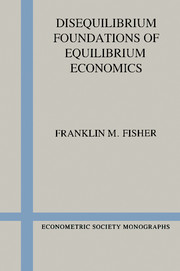Crossref Citations
This Book has been
cited by the following publications. This list is generated based on data provided by Crossref.
Knox, P L
Gertler, M
Jones, K
White, P E
Damesick, P J
Neale, R S
Goodwin, P B
and
Hay, A
1984.
Reviews: The Contested City, the Timing of Economic Activities: Firms, Households, and Markets in Time-Specific Analysis, a Census User's Handbook, Geography and Population: Approaches and Applications, Regional Planning Series 12. Dilemmas in Regional Policy, Regional Transformation and Industrial Revolution: A Geography of the Yorkshire Woollen Industry, Progress in Planning, Volume 19, Part 3. Cost Benefit Analysis and London's Transport Policies, Progress in Planning, Volume 21, Part 1. The Finance of Cities in West Germany.
Environment and Planning A: Economy and Space,
Vol. 16,
Issue. 12,
p.
1673.
Zanetti, G. N.
and
others
1984.
Opening the books: A review article∗.
New Zealand Economic Papers,
Vol. 18,
Issue. 1,
p.
13.
Snippe, J.
1985.
On the scope of hydraulic macroeconomics: Some reflections on Alan Coddington's Keynesian Economics.
De Economist,
Vol. 133,
Issue. 4,
p.
467.
Clark, G L
and
Gertler, M
1985.
An Adjustment Model of Regional Production.
Environment and Planning A: Economy and Space,
Vol. 17,
Issue. 2,
p.
231.
Mas-Colell, Andreu
1986.
Models of Economic Dynamics.
Vol. 264,
Issue. ,
p.
49.
Whitmore, Harland Wm.
1986.
Aggregate Economic Choice.
p.
1.
Samuelson, Larry
1986.
Microeconomic Theory.
p.
1.
Whitmore, Harland Wm.
1986.
Aggregate Economic Choice.
p.
424.
Clark, Gordon L.
1986.
Dimensions of Spatial Price Dispersion Before and After the Crash of 1929.
Geographical Analysis,
Vol. 18,
Issue. 1,
p.
19.
Clark, Gordon L.
1986.
Regional Development and Policy: The Geography of Employment.
Progress in Human Geography,
Vol. 10,
Issue. 3,
p.
416.
Clark, G L
1986.
Towards an Alternative Conception of Job-Search Theory and Policy: Information as an Indeterminate Process.
Environment and Planning A: Economy and Space,
Vol. 18,
Issue. 6,
p.
803.
FLASCHEL, PETER
and
SEMMLER, WILL
1987.
CLASSICAL AND NEOCLASSICAL COMPETITIVE ADJUSTMENT PROCESSES.
The Manchester School,
Vol. 55,
Issue. 1,
p.
13.
Gandolfo, Giancarlo
1987.
The New Palgrave Dictionary of Economics.
p.
1.
Kitamura, Ryuichi
and
Van Der Hoorn, Toon
1987.
Regularity and irreversibility of weekly travel behavior.
Transportation,
Vol. 14,
Issue. 3,
p.
227.
Negishi, Takashi
1987.
The New Palgrave Dictionary of Economics.
p.
1.
Hoogduin, L. H.
and
Snippe, J.
1987.
Uncertainty in/of macroeconomics: An essay on adequate abstraction.
De Economist,
Vol. 135,
Issue. 4,
p.
429.
Nadal, Alejandro
and
Salas Paez, Carlos
1987.
Une réflexion sur les ensembles individuels non-bornés et la démonstration de l’existence de l’équilibre général.
Recherches économiques de Louvain,
Vol. 53,
Issue. 3,
p.
283.
Fisher, Franklin M.
1987.
The New Palgrave Dictionary of Economics.
p.
1.
Boland, Lawrence A.
1987.
On the Relevance of Neo-Walrasian Economic Theory: A Review.
History of Political Economy,
Vol. 19,
Issue. 4,
p.
659.
Clark, Gordon L.
Gertler, Meric S.
and
Whiteman, John
1988.
Regional Dynamics: A Reply to Our Critics.
Urban Geography,
Vol. 9,
Issue. 3,
p.
327.



